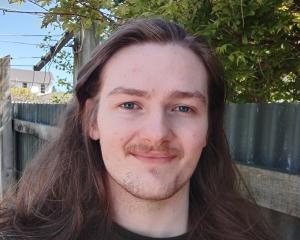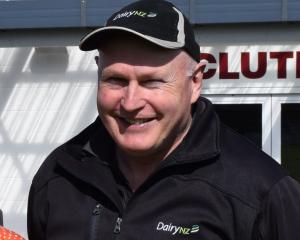
A Taieri family is looking to buy their first and last dairy farm.
Henley 50:50 sharemilkers Jonathan and Alice Reid and their children Sam, 7, and Livvy, 5, milk nearly 600 cows.
Mr Reid said milking the cows was the best part of each day.
Speaking at a DairyNZ event on the farm last week, Mr Reid said the farm business was profitable, producing $4400 per hectare for its owners and operators last season.
The return was more than the DairyNZ benchmark average of $2615 per hectare.
Ray Parker and Sharon Corcoran, of Twizel, own the nearly 200ha effective farm.
The Reid family wanted to buy their first dairy farm.
"Anywhere the wife and kids are happy to go, I’ll go," Mr Reid said.
An option to buy the farm where they were now sharemilking was turned down due to the "ferocious" cost of council rates on the farm, Mr Reid said.
The dream was to buy a farm, where they could milk more than 400 cows, Mr Reid said.
"We want our first farm to be our last farm. We want to buy a home as well as a business. We have been quite transient the last 10 years so it will be quite nice to put down some roots."
He wants for the farm to be on some on the best land available.

A possible way to buy a high-quality farm was to continue working as sharemilkers in Henley at the same time.
He wanted top-quality land because he knew people farming on poorer quality land, who were struggling to progress in the industry as a result.
The family wants to be farming the land long-term rather than chasing shorter term capital gains.
Dairy farm owner Simon Light, of Outram, who was in the audience, said the brokest he had ever been was when he became a farm owner but it was worth it.
He warned if $40,000 or more per hectare needed to be paid for a farm, it would be hard to make a profit.
"You are going backwards at these interest rates," Mr Light said.
Mr Reid said due to the current tough economic times, he was "geared up to buy a mortgagee sale" and being able to "dictate the terms".
"I’m hoping we are in a cycle at the minute and the cycle is putting people under and I can take advantage of that — I hate to say it but that is what I’m going to do."
He believed those type of opportunities would become available in the next 18 months.
He took advantage of a price drop when he bought his herd in 2015-16.
Mr Light said the price of cows fluctuated more than the price of farms and high-quality land tended to hold its price.
Mr Reid said he was sticking to his plan to buy his first farm.
"Hopefully the pressure will come on someone that needs to get rid of it and we can slip our way in."

"There are a lot of farmers on the Taieri who are getting old and their family are not staying in it so a few farms will come up in the next 10 years."
Dairy farm owner Duncan Wells, of Outram, said finding the right equity partner should be given greater priority than finding the right farm.
He urged Mr Reid to list what he wanted in a first farm and give each of them a weight on their importance, so a score could be produced when inspecting a property.
A narrow focus should be avoided when looking to buy a first farm, Mr Wells said.
"You don’t know what your opportunity is going to look like and you need to be ready to go, where the opportunities might be, might surprise you."
For Mr Reid, the path to working in the dairy industry began in 2011.
He left his home in Ireland to travel to New Zealand to watch the Rugby World Cup.
"My mum paid for my tickets to get here."
The qualified biochemist, who holds a Master’s Degree in clinical chemistry, worked in that industry to get his New Zealand residency.
Once he became a New Zealander, he went dairy farming.
At the time, Mrs Reid was studying at university and now holds a Master’s Degree in finance.
Although they were qualified to work in other industries, 50:50 sharemilking was a more lucrative career than what they had trained in, he said.
"We choose to farm."

They began contract milking 500 cows for two years in Drummond in central Southland.
He felt lucky to go straight into a contract milking position, rather than starting in the industry as a farm assistant.
His dairy farming experience was limited and he taught himself on the fly by reading information on the DairyNZ website.
"To see if I could work my way through it."
Their next progression was contract milking 750 cows in Invercargill.
They bought their herd seven seasons ago and had been sharemilking in Clutha for four years before moving to Henley.
Mrs Reid said they had a "primo" 50:50 contract.
"Ray really looks after us and he was willing to negotiate the contract to get us to sign," Mrs Reid said.
Mr Reid said since being on the farm they had brought their calving date forward about a week to August 1, which had improved mating results.
The six week in-calf rate was 79%, which was 1% above the DairyNZ industry target.
A boost in the rate was possible in the first season in Henley in 2021-22 by utilising feed to improve body condition of their herd rather than using it to put more milk in the vat.
Using the feed to improve mating outcomes allowed them to produce 294,000kg of milksolids the next 2022-23 season, which was 16,000ksMS more than their first season.
This season they were targeting producing 310,000kg of milksolids and harvesting pasture and crop, about 12.7tonnes of dry matter per hectare.

"We could grow more grass and put more cows on but we don’t have the water to sustain them over the summer time," Mr Reid said.
The scheme they took water from was fully allocated, Mr Reid said.
If they had access to more water, they could run more than 680 cows.
"We are completely hamstrung by the water, which is unfortunate because we could do a lot more production."
Water had to be delivered in tankers several times last season, Mr Reid said.
"We couldn’t wash the yard for six weeks — it was awful."
Both of the Reids were detail-oriented due to their past education and careers, a discipline which they carried over to their farm business.
"We critique what we do, it is ongoing, every day. We don’t get everything right — far from it — but if we get something wrong we know we’ve got it wrong and don’t get it wrong again," Mr Reid said.
ANZ South Otago relationship manager Tom Bekkers, of Dunedin, said someone wanting to buy their first farm, or find an equity partner, should know their numbers and be able to present their case.
Anyone wanting to buy their first farm must sell themselves and have the "gumption" to take the bull by the horns, he said.
Mr Bekkers predicted the clear goals and desires of the Reids would result in a future field day being held on their own farm within the next three years.
"Hopefully," Mr Reid said. "We’ll wait and see."















